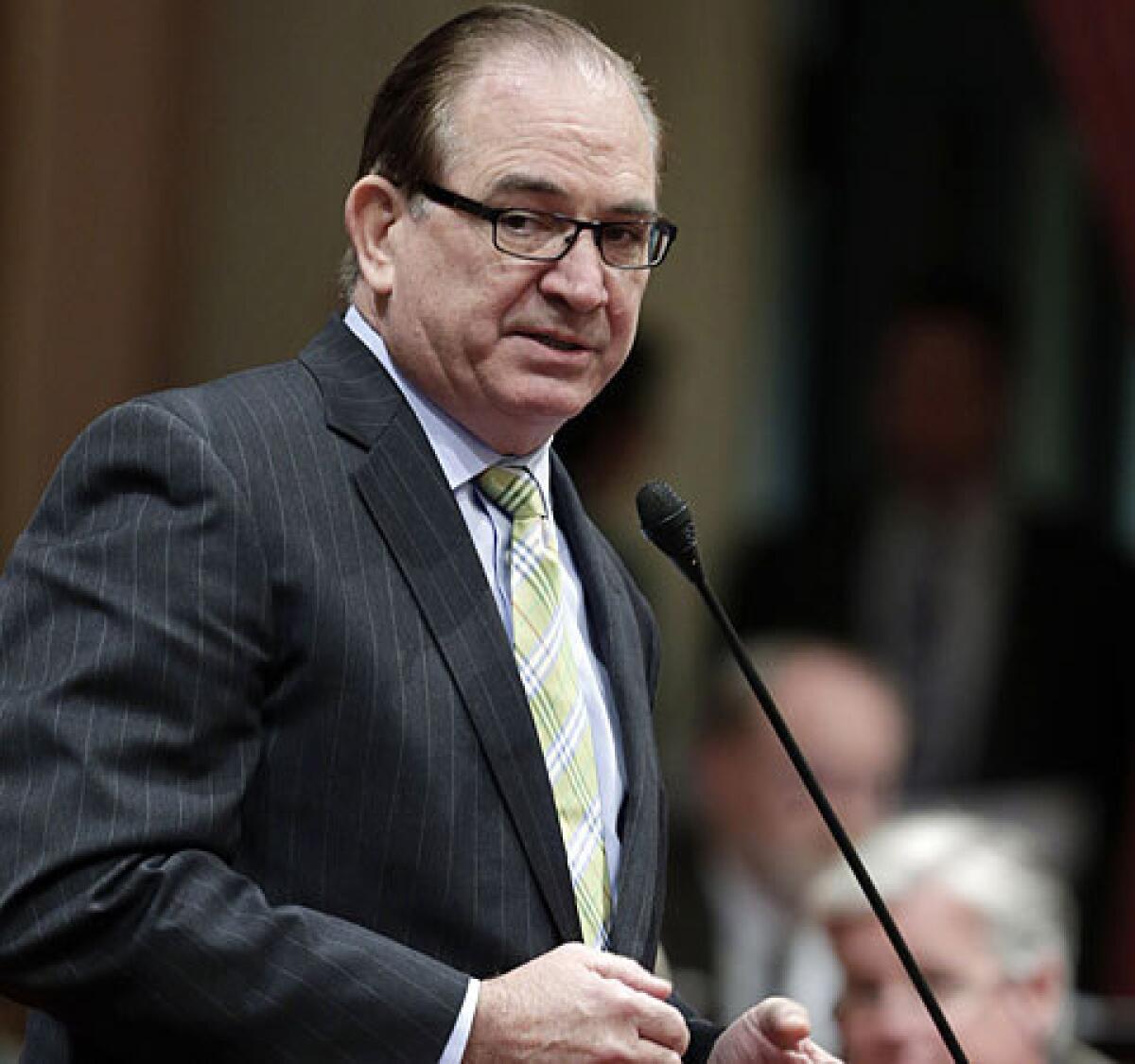Campaign donor, affirmative action bills go down without supermajority

- Share via
SACRAMENTO — The Democrats’ loss of a legislative supermajority stifled their push to change California’s campaign finance and affirmative action laws Monday, potentially foreshadowing a return to partisan battles over their other priorities, such as property taxes, water policy and a rainy-day fund.
Monday’s losses come less than two years after Democrats won a historic two-thirds control over both the state Senate and Assembly, eliminating the need for a single Republican vote on any bill.
That advantage slipped away when Sen. Ronald S. Calderon of Montebello, indicted on bribery and money-laundering charges, took a hiatus from office. The consequences arrived swiftly.
A proposal to expand disclosure of the sources of campaign cash failed to garner Republican support in the Senate. The measure had passed the Assembly but on Monday fell one vote short of the two-thirds approval it needed to clear the Legislature.
“I’m concerned that unless we regain a supermajority, the Republicans will continue their agenda of hiding the identities of multimillionaires who are donors,” said Sen. Kevin de Leon (D-Los Angeles).
The bill was a response to a controversy over $15 million funneled to California campaigns in 2012 by a network of secretive nonprofits with ties to conservative billionaires Charles and David Koch.
Sen. Bob Huff of Diamond Bar, leader of the Republicans in the upper house, said Monday that the measure was unnecessary but that he could support additional disclosure requirements if they kicked in next year rather than in this election year.
But “the majority party refused so they could turn this into another cheap political stunt,” Huff said.
A 2014 effective date would mean that donors “do not have time to understand that the rules of engagement have changed,” he said.
The bill’s author, Sen. Lou Correa (D-Santa Ana), wanted more disclosure in time for this year’s elections and could bring the proposal, SB 27, back for another vote before the session ends Aug. 31.
The lack of a supermajority also loomed in the decision to shelve a proposed constitutional amendment to overturn the state’s ban on affirmative action at colleges and universities.
The measure, by state Sen. Ed Hernandez (D-West Covina), passed the Senate in January, when it had a Democratic supermajority.
But the effort to change the Constitution, which bans consideration of race, sex or ethnicity in hiring and admissions decisions, has attracted an increasingly vocal backlash in recent weeks. Some Chinese Americans, for example, have worried that their children may lose admission spots to other students from underrepresented racial or ethnic groups.
If the measure is amended in the Assembly to address their concerns, it would go back to the Senate and again need a two-thirds vote to pass. But Republicans in the upper house now have the ability to block such legislation.
Legislative leaders announced Monday that they would delay consideration of the measure and convene a task force of academics and lawmakers to study minority representation.
Senate Democrats’ supermajority could be restored this year if Sen. Roderick Wright’s recent felony conviction for perjury and voter fraud is upheld at a court hearing May 16 and he resigns, forcing a special election in a district that is predominantly Democratic.
Wright, who represents an Inglewood district, took a leave of absence shortly before Calderon.
But unless a contender wins outright in the primary, that seat would not be filled before the legislative session ends. And 20 seats — half of the Senate — are up for election this year. It is unclear whether the Democrats will come back with a supermajority in 2015.
Meanwhile, the lack of one is likely to hinder the redrafting of an $11-billion water bond on the November ballot to make it smaller and more likely to be approved by voters. Republicans will have leverage to make demands in that process in exchange for the votes needed to revise the measure.
A bill that would tax oil drilled from the ground in California is unlikely to pass without a supermajority. And Gov. Jerry Brown could be stymied in his plans to put a measure on the ballot to create new rules for a rainy-day fund.
In the long term, the lack of a supermajority would be likely to prevent Democrats from pursuing changes to Proposition 13 — reducing the vote required for local tax increases, for example.
Any constitutional amendment would pass only if Republicans were given a seat at the negotiating table.
The legislative process is healthier without a supermajority, said Peter DeMarco, a spokesman for the Senate Republican Caucus.
“It means that legislation will appropriately get bipartisan consideration, and that’s good for all Californians,” he said.
More to Read
Sign up for Essential California
The most important California stories and recommendations in your inbox every morning.
You may occasionally receive promotional content from the Los Angeles Times.












